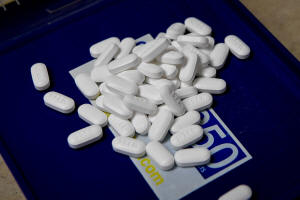CVS, Walmart, Walgreens agree to pay $13.8 billion to settle U.S. opioid
claims - sources
 Send a link to a friend
Send a link to a friend
 [November 02, 2022]
By Brendan Pierson [November 02, 2022]
By Brendan Pierson
(Reuters) - CVS Health Corp, Walgreens
Boots Alliance Inc and Walmart Inc have tentatively agreed to pay about
$13.8 billion to resolve thousands of U.S. state and local government
lawsuits accusing the chains of mishandling opioid painkillers,
according to two people familiar with the negotiations.
The proposed settlement calls for CVS to pay $5 billion over 10 years,
Walgreens to pay $5.7 billion over 15 years and Walmart to pay $3.1
billion, mostly up front, according to the people. The sources declined
to be identified, saying they were not authorized to speak publicly
about the matter.
CVS announced its portion of the deal, which includes $4.9 billion for
state, county and city governments and $130 million for Native American
tribes, Wednesday morning.

"We are pleased to resolve these longstanding claims and putting them
behind us is in the best interest of all parties, as well as our
customers, colleagues and shareholders," CVS general counsel Thomas
Moriarty said in a statement. The company did not admit wrongdoing.
Walmart and Walgreens declined to comment. A spokesperson for the
plaintiffs' attorneys in the litigation did not immediately respond to a
request for comment.
The proposed settlement, which would be the first nationwide deal with
retail pharmacy companies, follows nationwide opioid settlements with
drugmakers and distributors totaling more than $33 billion.
In more than 3,300 lawsuits, beginning in 2017, state and local
governments accused drugmakers of downplaying the risks of their opioid
pain medicines, and distributors and pharmacies of ignoring red flags
that prescriptions were being diverted into illegal trafficking.
They said the resulting human toll, as well as strain on public health
services and law enforcement, was a public nuisance that the companies
must pay to fix.
CVS, Walgreens and Walmart are the three largest retail pharmacies in
the country by market share. If their settlement becomes final, it will
put much of the sprawling, years-long litigation over opioids to rest,
though cases are still pending against smaller, more regionally focused
pharmacy operators including Rite Aid Corp and Kroger Co.
[to top of second column]
|

Tablets of the opioid-based Hydrocodone
at a pharmacy in Portsmouth, Ohio, June 21, 2017. REUTERS/Bryan
Woolston/File Photo
 Plaintiffs had scored some
significant trial victories against pharmacy chains, including a
$650.6 million judgment in favor of two Ohio counties against CVS,
Walgreens Boots Alliance and Walmart, and a ruling that Walgreens
contributed to the opioid epidemic in San Francisco.
Previous settlements netted $21 billion from the three largest U.S.
drug distributors, $5 billion from Johnson & Johnson, $4.35 billion
from Teva Pharmaceutical Industries Ltd, $2.37 billion from AbbVie
Inc and $450 million from Endo International Plc.
Purdue Pharma LP, whose prescription pill OxyContin is widely blamed
for sparking the addiction and overdose crisis, and its Sackler
family owners are seeking to resolve opioid claims against them
through a $6 billion settlement in bankruptcy court.
State and local authorities have said they will use the money from
the settlements to combat the opioid crisis, which according to
federal government data has caused nearly 650,000 overdose deaths
since 1999 and is continuing to worsen.
Prescriptions for opioids rose sharply in the 1990s as companies
aggressively promoted the drugs, long used primarily in cancer
patients, as a safe way to treat all kinds of chronic pain.
Overdoses involving opioids, including prescription pills and
heroin, surged further during the COVID-19 pandemic, increasing 38%
in 2020 over the previous year and another 15% in 2021, according to
the U.S. Centers for Disease Control and Prevention.
The agency has attributed much of the recent rise in overdose cases
to illegally manufactured fentanyl, a powerful synthetic opioid.

A congressional report last month put the economic toll of the
opioid crisis in 2020 alone at $1.5 trillion.
(Reporting by Baranjot Kaur in Bengaluru, Brendan Pierson in New
York and Nate Raymond in Boston; Editing by Alexia Garamfalvi,
Kenneth Maxwell and Mark Potter)
[© 2022 Thomson Reuters. All rights
reserved.] This material may not be published,
broadcast, rewritten or redistributed.
Thompson Reuters is solely responsible for this content. |